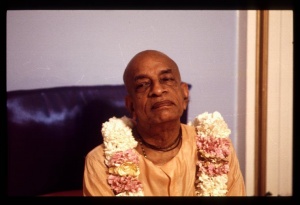SB 11.8.30: Difference between revisions
m (1 revision(s)) |
No edit summary |
||
| Line 1: | Line 1: | ||
{{info | {{info | ||
|speaker= | |speaker=Pińgalā the prostitute | ||
|listener= | |listener=Pińgalā the prostitute thinking to herself | ||
}} | }} | ||
[[Category:Srimad-Bhagavatam - Canto 11 Chapter 08]] | |||
[[Category:Bhagavatam Verses Spoken by Pingala the Prostitute - Vanisource|110830]] | |||
<div style="float:left">'''[[Srimad-Bhagavatam]] - [[SB 11|Eleventh Canto]] - [[SB 11.8: The Story of Pingala|Chapter 8: The Story of Pińgalā]]'''</div> | |||
<div style="float:right">[[File:Go-previous.png|link=SB 11.8.29]] '''[[SB 11.8.29]] - [[SB 11.8.31]]''' [[File:Go-next.png|link=SB 11.8.31]]</div> | |||
{{RandomImage}} | |||
{{SBnotice}} | |||
==== TEXT 30 ==== | ==== TEXT 30 ==== | ||
<div | <div class="verse"> | ||
piṅgalovāca | :piṅgalovāca | ||
aho me moha-vitatiṁ | :aho me moha-vitatiṁ | ||
paśyatāvijitātmanaḥ | :paśyatāvijitātmanaḥ | ||
yā kāntād asataḥ kāmaṁ | :yā kāntād asataḥ kāmaṁ | ||
kāmaye yena bāliśā | :kāmaye yena bāliśā | ||
</div> | </div> | ||
| Line 18: | Line 23: | ||
==== SYNONYMS ==== | ==== SYNONYMS ==== | ||
<div | <div class="synonyms"> | ||
piṅgalā—Piṅgalā; uvāca—said; aho—oh; me—my; moha—of illusion; vitatim—expansion; paśyata—just see, everyone; avijita-ātmanaḥ—of one whose mind is not controlled; yā—which person (me); | piṅgalā—Piṅgalā; uvāca—said; aho—oh; me—my; moha—of illusion; vitatim—expansion; paśyata—just see, everyone; avijita-ātmanaḥ—of one whose mind is not controlled; yā—which person (me); kāntāt—from a lover; asataḥ—useless, insignificant; kāmam—lusty pleasure; kāmaye—I desire; yena—because; bāliśā—I am a fool. | ||
</div> | </div> | ||
{{SBcollapse}} | |||
==== TRANSLATION ==== | ==== TRANSLATION ==== | ||
<div | <div class="translation"> | ||
The prostitute Piṅgalā said: Just see how greatly illusioned I am ! Because I cannot control my mind, just like a fool I desire lusty pleasure from an insignificant man. | The prostitute Piṅgalā said: Just see how greatly illusioned I am ! Because I cannot control my mind, just like a fool I desire lusty pleasure from an insignificant man. | ||
</div> | </div> | ||
| Line 32: | Line 37: | ||
==== PURPORT ==== | ==== PURPORT ==== | ||
<div | <div class="purport"> | ||
In material existence all of the senses are attracted by different objects, and thus the conditioned soul becomes a first-class fool. The cause of material life is one's indifference to the Absolute Truth. The conditioned soul considers himself to be the lord and enjoyer of the material world and considers the purpose of life to be sense gratification. The more one tries to enjoy the material world, the more one's illusion increases. | In material existence all of the senses are attracted by different objects, and thus the conditioned soul becomes a first-class fool. The cause of material life is one's indifference to the Absolute Truth. The conditioned soul considers himself to be the lord and enjoyer of the material world and considers the purpose of life to be sense gratification. The more one tries to enjoy the material world, the more one's illusion increases. | ||
It appears from this verse that the prostitute Piṅgalā was not only earning her livelihood through prostitution, but was actually enjoying her illicit contact with innumerable men. The words kāntād asataḥ indicate that she was freely selling herself without discrimination to the most ordinary and useless men, considering them to be "lovers." Thus she says, "I was a great fool." The word bāliśā means "one who has a childish mentality, without practical experience of right and wrong." | It appears from this verse that the prostitute Piṅgalā was not only earning her livelihood through prostitution, but was actually enjoying her illicit contact with innumerable men. The words ''kāntād asataḥ'' indicate that she was freely selling herself without discrimination to the most ordinary and useless men, considering them to be "lovers." Thus she says, "I was a great fool." The word bāliśā means "one who has a childish mentality, without practical experience of right and wrong." | ||
</div> | </div> | ||
__NOTOC__ | </div> | ||
</div> | |||
<div style="float:right">[[File:Go-previous.png|link=SB 11.8.29]] '''[[SB 11.8.29]] - [[SB 11.8.31]]''' [[File:Go-next.png|link=SB 11.8.31]]</div> | |||
__NOTOC__ | |||
__NOEDITSECTION__ | |||
Revision as of 12:40, 24 June 2021

A.C. Bhaktivedanta Swami Prabhupada
Please note: The synonyms, translation and purport of this verse were composed by disciples of Śrīla Prabhupāda
TEXT 30
- piṅgalovāca
- aho me moha-vitatiṁ
- paśyatāvijitātmanaḥ
- yā kāntād asataḥ kāmaṁ
- kāmaye yena bāliśā
SYNONYMS
piṅgalā—Piṅgalā; uvāca—said; aho—oh; me—my; moha—of illusion; vitatim—expansion; paśyata—just see, everyone; avijita-ātmanaḥ—of one whose mind is not controlled; yā—which person (me); kāntāt—from a lover; asataḥ—useless, insignificant; kāmam—lusty pleasure; kāmaye—I desire; yena—because; bāliśā—I am a fool.
Translation and purport composed by disciples of Śrīla Prabhupāda
TRANSLATION
The prostitute Piṅgalā said: Just see how greatly illusioned I am ! Because I cannot control my mind, just like a fool I desire lusty pleasure from an insignificant man.
PURPORT
In material existence all of the senses are attracted by different objects, and thus the conditioned soul becomes a first-class fool. The cause of material life is one's indifference to the Absolute Truth. The conditioned soul considers himself to be the lord and enjoyer of the material world and considers the purpose of life to be sense gratification. The more one tries to enjoy the material world, the more one's illusion increases.
It appears from this verse that the prostitute Piṅgalā was not only earning her livelihood through prostitution, but was actually enjoying her illicit contact with innumerable men. The words kāntād asataḥ indicate that she was freely selling herself without discrimination to the most ordinary and useless men, considering them to be "lovers." Thus she says, "I was a great fool." The word bāliśā means "one who has a childish mentality, without practical experience of right and wrong."